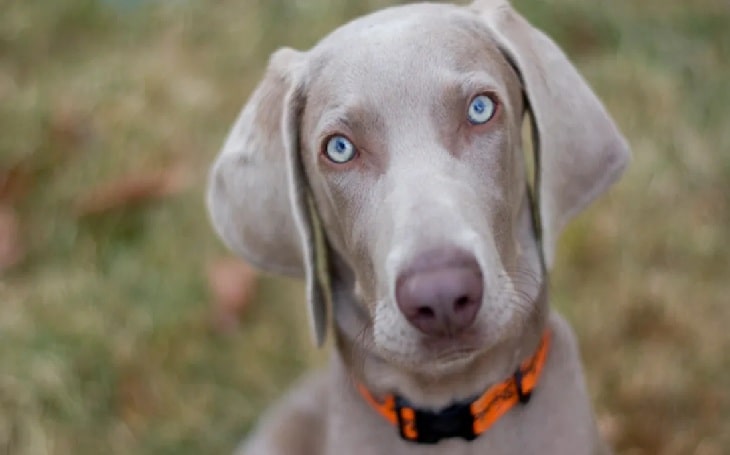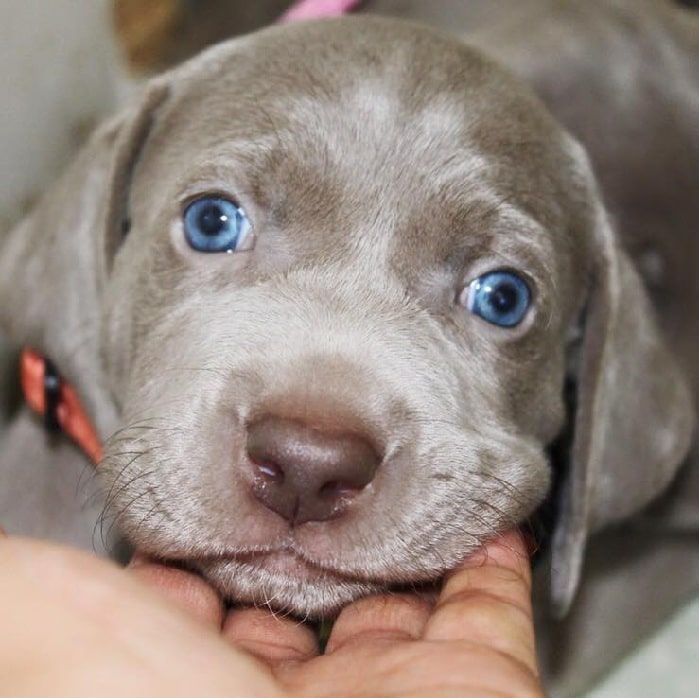Weimaraner Dog Breed Information
| Country of Origin | Germany |
| Nicknames and Other Names | Raner Grey Ghost Weimaraner Vorstehhund |
| Scientific Name | Canis lupus familiaris |
| Breed Type | Purebred |
| Group | Sporting Group gun Dogs |
| Bred For | Hunting small game like rabbits, fowl, and foxes |
| Size | Medium-sized |
| Recognized By | AKC, FCI, UKC, CKC, ANKC, NZKC |
| Life Span | 10-13 years |
| Ideal Weight | Male: 70-90 pounds Female: 55-75 pounds |
| Ideal Height | Male: 25-27 inches Female: 23-25 inches |
| Fur Type | Short, hard, smooth to touch |
| Common Colors | Blue, Silver Gray, Gray |
| Markings | None |
| Availability | Widely available |
| Achievements | Appeared in TV shows |
| Suitable for Apartments | Mildly suitable |
| Used in World War | No |
| Other War | Used in Cold War |
| Most Similar To | Vizsla |
The Weimaraner is a medium-sized hunting dog with an athletic and muscular body built. It is also known by the names like Weimar Pointer, Weimaraner Vorstehhund, the Greydog, and the Grey Ghost.
Weimaraner are active dogs that are not suited for apartment life. They need a house in the countryside with a big yard. They need regular exercise, so an active owner who loves to hike, run, or go for hunting is best suited for them.
The Weimaraner is a strong and muscular dog that has high stamina and speed. Their head is moderately long with ears that long, set high and hang on the side of the jaws. Their front legs are strong, muscular and straight. The coat is short, smooth and sleek. However, long coat is not acceptable.
Origin and History
The Weimaraner was developed around the 1800s in Germany. It is believed that this breed was developed by mixing several breeds like the Bloodhound, German Shorthaired Pointer, English Pointer, and Blue Great Dane.
They were used by the sportsman to hunt big games like deer, mountain lion, bear, and wolves. They were also used for pointing and retrieving birds and waterfowl.

Image Source: AKC
The American Kennel Club recognized the Weimaraner in 1934 and is one of the very popular American Kennel Club registered breeds.
Is Weimaraner Child-Friendly?
The Weimaraner gets along with children well as they are loving and fond of children. They love kid’s company and enjoy playing with them.
As a hunting dog, they are very active and energetic, which can be too much for small children. Therefore, if you consider keeping Weimaraner in a house with small children, close supervision is needed.

Image Source: Instagram-@pamelaparolin
Temperament, Behavior, and Personality
Temperament: The Weimaraner has a friendly temperament which is a very active dog that does well in an active family as a companion. They are loving of their people and are very loyal and devoted to them. they form a strong bond with one particular member of the family and see him/her as its master.
Behavior: The Weimaraner, as being a hunting dog, will chase any small animals they see running. Therefore, this behavior can get you into trouble as they might chase and hurt your neighbor pets. So, keep them in a well-fenced yard and on a leash while taking out.
Personality: The Weimaraner has a gentle, loving, and active personality. They love to live indoors with their family and does not do well outside in a kennel. They tend to bark at strangers and any unusual activities in the surrounding. Therefore, they make a great watchdog.
Trainability
The Weimaraner can be a difficult dog to train as they are stubborn and mischievous. A lot of patients is required to train them. First, you need to establish strong leadership upon them. They need a consistent leader who can train them with firmness.
Use positive methods of training to encourage and motivate them. Reward them with delicious treats and a lot of vocal praises.
Facts
- A Weimaraner lived in a White House with President Dwight D. Eisenhower.
- Artist William Wegman became famous after he used Weimaraner in his work of video segment. It appeared on the children’s TV show Sesame.
- The eye color of the Weimaraner changes as they age. It turns from light blue to amber or gray-blue.
Health Issues
| General Health | Healthy |
| Common Health Issues | Progressive Retinal Atrophy, Von Willebrand’s Disease, Bloat, Drug Sensitivity, Ectropion, Entropion, Distichiasis |
| Hypoallergenic | No |
| Vaccination Required | Canine Coronavirus, Rabies, Canine Distemper, Canine Parvovirus, Kennel Cough, Leptospirosis, Canine Parainfluenza |
| Shedding | Moderate Shedder |
| Drooling | Quite a Lot Drooler |
| Grooming | Easy and Minimal Grooming Required |
| Weight Gain Potential | Low to Average |
| Separation Anxiety | High Chance |
| Allergies | None |
| Diets and Supplements | Protein: 25% Fat: 8% Coenzyme Q10 Glucosamine Omega-3 and 6 Fatty Acids |
The Weimaraner is usually a healthy breed with a life expectancy of 10-13 years. In these years, they can face the following possible canine health problems:
- Hypothyroidism: It is a condition which is caused by the deficiency of thyroid hormones. This deficiency can lead to obesity, mental dullness, infertility or lack of energy. It can be managed by daily consumption of thyroid pills.
- Hip Dysplasia: Hip dysplasia is common in medium or large-sized dogs. It can be genetic or can be seen in dogs due to the dislocation of the hip joints. A serious condition can be managed by surgery after proper consultation with a vet.
Colors
The Weimaraner comes in following colors according to American Kennel Club:
- Blue
- Gray
- Silver Gray
Puppies

Image Source: www.starweimaraners.com 
Image Source: Camelot Weimaraners
Height and Size: The average height of the male Weimaraner is between 25-27 and the female is 23-25 inches. Likewise, the average weight of the male is 70-90 pounds and the female is 55-75 pounds.
Cost: The average cost of the Weimaraner puppy is between $1500-$2000 USD.
Similar Dog Breeds to Weimaraner
Visit Doglime for more information about dog breeds history, behavior, training, and puppies.
Tags












